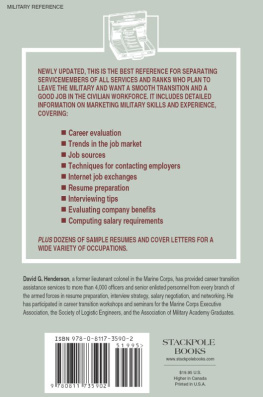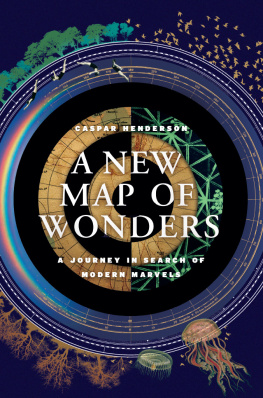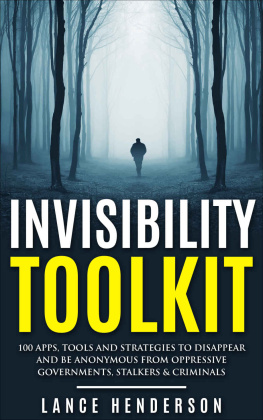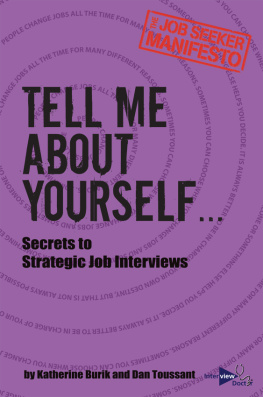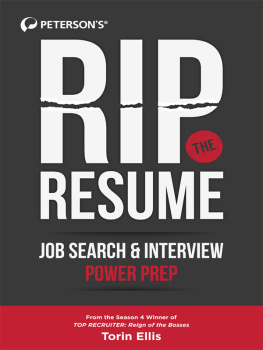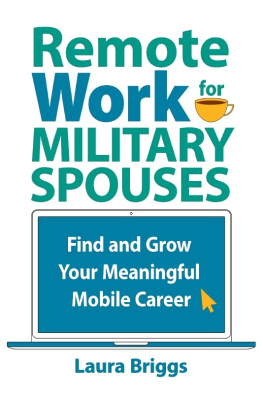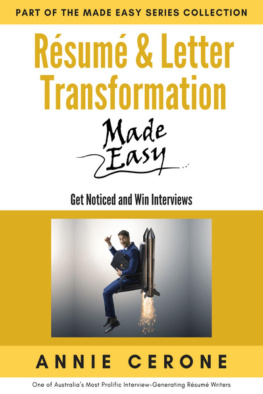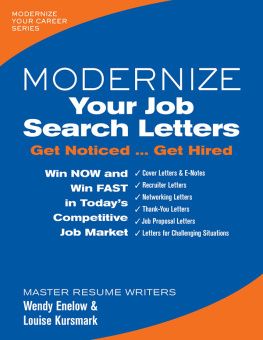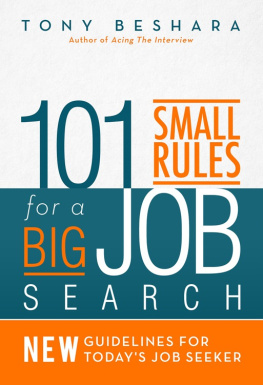Henderson - Job search: marketing your military experience
Here you can read online Henderson - Job search: marketing your military experience full text of the book (entire story) in english for free. Download pdf and epub, get meaning, cover and reviews about this ebook. City: Mechanicsburg;PA;United States, year: 2009;2012, publisher: Stackpole Books, genre: Home and family. Description of the work, (preface) as well as reviews are available. Best literature library LitArk.com created for fans of good reading and offers a wide selection of genres:
Romance novel
Science fiction
Adventure
Detective
Science
History
Home and family
Prose
Art
Politics
Computer
Non-fiction
Religion
Business
Children
Humor
Choose a favorite category and find really read worthwhile books. Enjoy immersion in the world of imagination, feel the emotions of the characters or learn something new for yourself, make an fascinating discovery.
- Book:Job search: marketing your military experience
- Author:
- Publisher:Stackpole Books
- Genre:
- Year:2009;2012
- City:Mechanicsburg;PA;United States
- Rating:4 / 5
- Favourites:Add to favourites
- Your mark:
- 80
- 1
- 2
- 3
- 4
- 5
Job search: marketing your military experience: summary, description and annotation
We offer to read an annotation, description, summary or preface (depends on what the author of the book "Job search: marketing your military experience" wrote himself). If you haven't found the necessary information about the book — write in the comments, we will try to find it.
Job search: marketing your military experience — read online for free the complete book (whole text) full work
Below is the text of the book, divided by pages. System saving the place of the last page read, allows you to conveniently read the book "Job search: marketing your military experience" online for free, without having to search again every time where you left off. Put a bookmark, and you can go to the page where you finished reading at any time.
Font size:
Interval:
Bookmark:
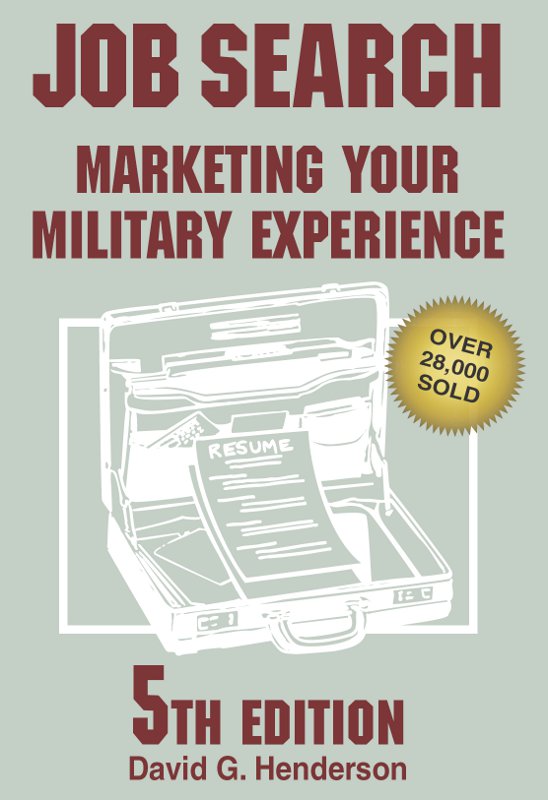
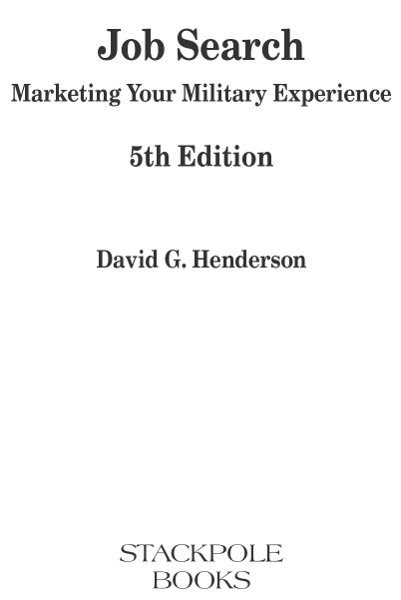
Copyright 2009 by Stackpole Books
Published by
STACKPOLE BOOKS
5067 Ritter Road
Mechanicsburg, PA 17055
www.stackpolebooks.com
All rights reserved, including the right to reproduce this book or portions thereof in any form or by any means, electronic or mechanical, including photocopying, recording, or by any information storage and retrieval system, without permission in writing from the publisher. All inquiries should be addressed to Stackpole Books, 5067 Ritter Road, Mechanicsburg, PA 17055.
Printed in the United States of America
10 9 8 7 6 5 4 3 2 1
Cover design by Tessa J. Sweigert
We gratefully acknowledge the cooperation of Herb Schwab for use of the Army Career and Alumni Program home page.
Library of Congress Cataloging-in-Publication Data
Henderson, David G., 1939
Job search : marketing your military experience / David G. Henderson.5th ed.
p. cm.
Includes .
ISBN-13: 978-0-8117-3590-2
ISBN-10: 0-8117-3590-7
1. Job huntingUnited States. 2. Risumis (Employment) 3. Retired military personnelEmploymentUnited States. 4. Career changesUnited States. I. Title.
HF5382.75.U6H46 2009
650.14086'970973dc22
2009016448
Contents
Resumes by Occupational Specialty and Format
Sample Cover Letters and Thank-You Letters
Military ServiceRelated Organizations
Examples of Computing Salary Requirements
Recommended Reading
Acknowledgments
Special thanks are due to those who provided comments, suggested additions, and offered encouragement on this fifth edition, including Col. Joe Breen, USAF (Ret.); Sgt.Major Mark Hornung, USMC (Ret.); Susan Rubel, Robert Moran, and Jane Symionow of the Air Force Association; Bill Gaul, former President of The Destiny Group; and all of the former clients who graciously allowed me to use their resumes in this edition of the book.
I would also like to thank my wife, Debbie, for her graphic design work for the illustrations and charts. Lastly, I would like to thank my editor, Mark Allison, and his able assistant, Janelle Steen, for their patience and support in getting the fifth edition to press, and all the sales staff who have worked with me to ensure that Job Search continues to remain the top career transition book for retiring and separating military personnel as it has been for the past nineteen years.
Introduction
He who is not prepared today will be less so tomorrow.
Ovid
Welcome to CIVWORLD! If you are completing military service in the near future, you will soon find yourself competing in an environment very different from that to which you have previously been exposed. This new environment, with a set of rules all its own, is called the civilian job market. It has no training manuals, field exercises, or operational readiness inspections to prepare you for its often puzzling and exasperating ways, where at times the only enemy turns out to be an empty mailbox, snail mail or e-mail, or a phone that doesnt ring.
Despite your previous military career experiences and your rapid ability to adapt to new jobs and responsibilities, you will still be faced with some tough choices as you approach the end of your active service. In the past, a set of orders provided you with all the information you needed to move on to the next duty station and start your new assignment. Once you have made the decision to leave active duty, however, there will be no set of orders, and the new assignment will be up to you. Where you choose to settle and what you elect to do will be critical to you and your family given a fluctuating economy and a job market that is constantly reinventing itself. So, now the real adventure begins!
Whether you are leaving the service after four years or twenty-plus years, you will be taking with you a wealth of experience, training, and specialized skills in a variety of occupational fields, or possibly just one occupational field. As you start your job search, you will find that a number of these occupational fields correspond directly to occupations or professions in the civilian workforce. In fact, if the majority of your service has been in one of these directly relatable civilian occupations, you will be able to identify a crossover occupational field without any problem. If, however, you are uncertain about how to use your military skills in the civilian marketplace, this book is for you. It was specifically designed to address this issue, as well as others facing those who fall into what is commonly called the generalist category, which accommodates those who served in more than one occupational specialty during the course of their military career.
When should you start your job search? Is a professional resume necessary before you begin the hunt for a new job? Where do you first look for a job? How long will it take to land that first job? Should you post your resume on the Internet? What sort of Internet job banks, bulletin boards, and job search engines will be available to assist you in your job search as you exit the service? How should you prepare for your first interview? What salary should you expect to be offered for your new job? These are some of the more common questions separating and retiring members ask once they decide to leave the military. This book answers these questions and many more.
Each chapter of Job Search represents a major investment of time, especially if you do the required research in unfamiliar areas and then systematically file employment-related information for future use. As you prepare for your own job search, it is best to start twelve to eighteen months in advance of your separation or retirement date. Assess your interests, skills, experience, and lifestyle; set career goals; research the job market for the area where you plan to settle after leaving the military; prepare a marketable resume to support your desired area of work; circulate your resume in the marketplace and on the Internet (selectively); and learn all you can about the interview process, including salary negotiation and the principal components of a compensation package. Follow this advice and the other job search information in this book, and you could easily be on your way to achieving another successful rite of passagefrom military servicemember to productive civilian employee.
If you have already made the transition to the civilian workforce, but you have decided a job change is in order, this book will be an excellent reference as you tackle the job search process once again. You may even find current job market information that wasnt available during your first job search.
Another added attraction of this book is the collection of sample resumes prepared for former servicemembers who, like yourself, were also transitioning for the first time, or possibly changing jobs for the second time since their initial transition. Although resume formats have not changed all that much over the years, there are a few new wrinkles in the main categories that make up the resume. The addition of a Computer Skills section (i.e., identifying ones proficiency in standard Microsoft operating systems and software, as well as any military systems), an Awards and Achievements section, a Special Achievements/Accomplishments or Special Qualifications section, the inclusion of a current government security clearance, and the emphasis on a ten-year window of career experience, rather than summarizing all of your work experience since you started in the military, have quietly moved to the forefront in the preparation of a new millennium resume.
Next pageFont size:
Interval:
Bookmark:
Similar books «Job search: marketing your military experience»
Look at similar books to Job search: marketing your military experience. We have selected literature similar in name and meaning in the hope of providing readers with more options to find new, interesting, not yet read works.
Discussion, reviews of the book Job search: marketing your military experience and just readers' own opinions. Leave your comments, write what you think about the work, its meaning or the main characters. Specify what exactly you liked and what you didn't like, and why you think so.

